#Jim has a crisis
Text
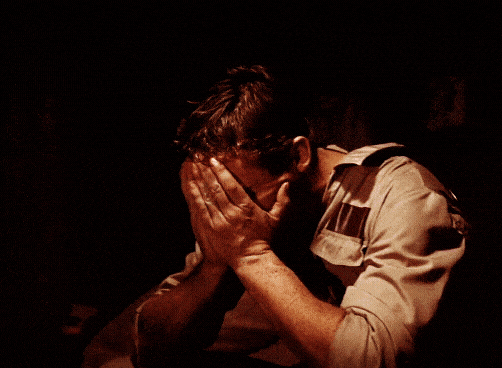
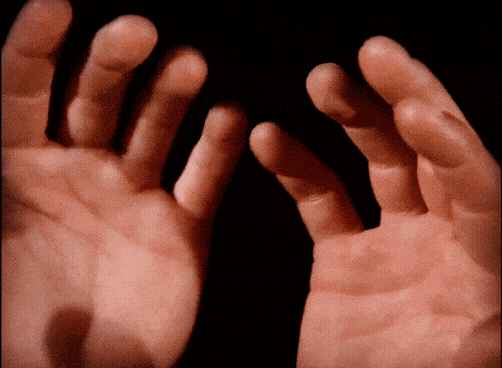
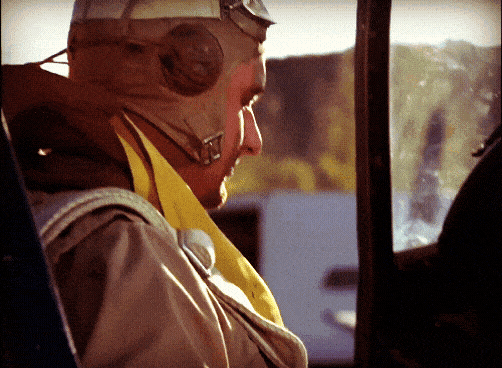
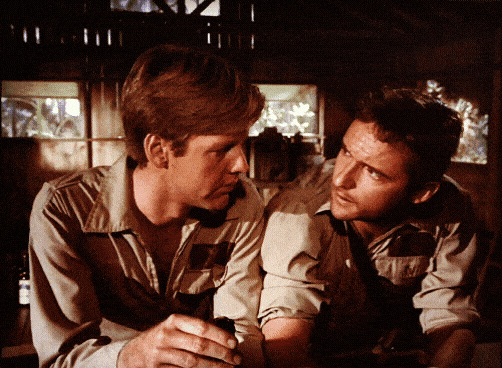

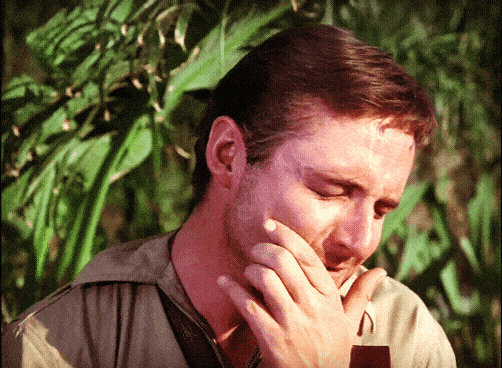
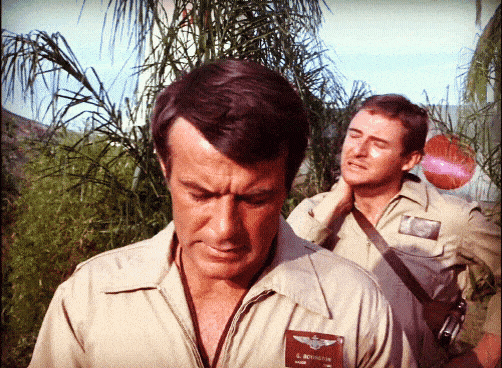

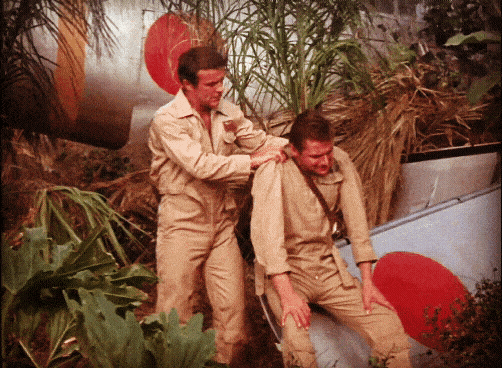
This day's theme was perfect for gifs from Devil in the Slot. Especially because Jim tried to get a grip of his fears by himself, not knowing he needed that pep talk from Greg to get him going.
@whumptober
@thethistlegirl
Ao3 link here
#whumptober2023#no.15#I don't need you to help me I can handle things myself#black sheep squadron#gif#jim gutterman#greg boyington#tj wiley#baa baa black sheep#1x16#devil in the slot#my gifs#black sheep squadron gifs#my edit#james whitmore jr#robert conrad#robert ginty#shaky hands#Jim has a crisis
15 notes
·
View notes
Text

December 1988. Overall, the Jim Starlin/Mike Mignola COSMIC ODYSSEY miniseries is pretty awful — it has cool art, but, like most of Starlin's DC work during this period, it's gratuitously brutal and ugly, and both Starlin's offensive treatment of the Kirby Fourth World mythos and the senseless character assassination of John Stewart did lasting damage — but it does have its moments.
#comics#cosmic odyssey#jim starlin#mike mignola#carlos garzon#steve oliff#superman#lightray#new gods#batman#fourth world#john stewart#starlin has his own brand of cosmic stuff#but he does not get or respect the jewish underpinnings#of kirby's fourth world saga#i waver on whether it's worse than john byrne's determination#to colonize all of kirby's work#but it's certainly as bad#and dc's post-crisis determination#to recast darkseid as a superman villain#is troubling#superbat
5 notes
·
View notes
Text
On the Enterprise there's an unofficial and secret club. the members gather at night in Janice Rand's quarters, you cannot sign up nor is it by invitation you must find out of the club by yourself and choose whether you join or go about your days with forbidden knowledge, unable to do anything about it. the meetings are long, with bright lights and delicious food and only the best music (kept quiet bc of the late hour of course). the vast majority of the crew are members and- oh? what is this? what's the club? well, it does not have an official name, however it is generally referred to as the "SF" club. (Spock Fuckers)
#I could never be the object of someone's desire#has this been done before?#the founding members were Bone Jim and Chapel#look at me and tell me that im wrong#tos#spirk#star trek#Spock#Chekov joined and then had an identity crisis about how many ppl were there#Spock does in fact know#well#he knows that there is a club#and that it is secret#and probably has something to do with sex knowing humans#but he is COMPLETELY oblivious to the fact that everyone thinks he's hot#the entire crew: BITCH#spones#dr mccoy#bones mccoy#leonard mccoy#jim kirk#james kirk
28 notes
·
View notes
Text
the boyfriend everyone's talking about is just jim carrey
#they really just put that man in situations#i'm so sorry but we put your boyfriend in a false reality since birth without his knowledge and put him on tv. he's having a crisis#i regret to inform you that your boyfriend has become god and must endure a grand test of character. i am so sorry.#your boyfriend put on loki's mask and turned into a cartoon villain#literally typecast as 'put him in a terrarium with lettuce'#man made millions being shaken around in a pringles can#boyfriend meme#jim carrey
1 note
·
View note
Text
tag drop /
#.⠀⠀*⠀⠀ ☀︎ ⠀⠀⁺ i get mean when i’m nervous like a bad dog ‚ michael wheeler .#.⠀⠀*⠀⠀ ☀︎ ⠀⠀⁺ where’s my fucking teenage dream ‚ maxine mayfield .#.⠀⠀*⠀⠀ ☀︎ ⠀⠀⁺ they made you a weapon & told you to find peace ‚ jane hopper .#.⠀⠀*⠀⠀ ☀︎ ⠀⠀⁺ i'm just a freak ‚ jonathan byers .#.⠀⠀*⠀⠀ ☀︎ ⠀⠀⁺ devil town is colder in the summertime ‚ will byers .#.⠀⠀*⠀⠀ ☀︎ ⠀⠀⁺ i wish i’d been a teen idle ‚ noa byers .#.⠀⠀*⠀⠀ ☀︎ ⠀⠀⁺ coffee & cigarettes ‚ jim hopper .#.⠀⠀*⠀⠀ ☀︎ ⠀⠀⁺ good heart but bad temper ‚ joyce byers .#.⠀⠀*⠀⠀ ☀︎ ⠀⠀⁺ maybe it did take a crisis to know myself ‚ steve harrington .#.⠀⠀*⠀⠀ ☀︎ ⠀⠀⁺ my whole life has been one big error ‚ robin buckley .#.⠀⠀*⠀⠀ ☀︎ ⠀⠀⁺ good old - fashioned lover boy ‚ lucas sinclair .#.⠀⠀*⠀⠀ ☀︎ ⠀⠀⁺ i do the best imitation of myself ‚ richard tozier .#.⠀⠀*⠀⠀ ☀︎ ⠀⠀⁺ the ghosts of what ifs quietly haunt me ‚ william denbrough .#.⠀⠀*⠀⠀ ☀︎ ⠀⠀⁺ i am the eater of worlds ‚ pennywise .
0 notes
Text
No Bruce is not "fine with being friends with people who kill all the time"
1) if you're referring to Diana she doesn't kill people all the time, she only kills in very extreme circumstances when she's forced to bc theres no other option, and it's only happened like three times total
2) Bruce very much is not fine with it when Diana kills. When she killed Maxwell Lord, it was written for the sole purpose of breaking up the Trinity for Infinity Crisis drama reasons, and Diana killing was chosen because Bruce (and Clark) would not be fine with it. At all
3) if you're referring to Ghostmaker, Bruce also isn't fine with him killing people and tries to stop him
4) if you're referring to Oliver Queen, they're not friends
5) if you're referring to Talia, Bruce also isn't fine with her killing people, and continuously has conflict with her about it
6) if you're referring to Helena, they're not friends and also Bruce treats her almost worse than Jason
7) if you're referring to Jim Gordon, Bruce still isn't fine with it, but also the copganda around him kinda makes consistent moral characterization a lost cause for Bruce in relation to him
8) I know you're not referring to Clark because nobody making this argument actually reads super comics let alone 80s super comics so none of you know about the Zod storyline, but Bruce didn't even know about that therefore its irrelevant
9) in case you might be referring to Harvey, Bruce also hasn't been friends with him since he became Two Face
10) I can't think of any others right now but whoever you're thinking of I can guarantee that if Bruce knows they killed someone and thinks its possible to influence them, there has been a storyline about him disapproving of them killing
11) if you're referring to Harley Quinn for some reason, they also are not friends
Like I dont get where you're coming from and also Bruce Wayne is very much not fine with his friends killing people
#i have to get a tag for complaining about fanon inaccuracies and bad arguments so i dont have to put these things in the main tags#i dont get this argument. fanon is supposedly for making things more fun but this is adding nothing to the story#what is the point of it#also the disrespect to diana is criminal#my posts
510 notes
·
View notes
Text
"For the first time, genetically modified pig kidneys provided “life-sustaining kidney function” during the course of a planned seven-day clinical study—a first step in addressing the critical crisis worldwide of kidney donor organ shortage.
The University of Alabama’s pre-clinical human study at Birmingham also advances the science and promise of xenotransplantation as a therapy to potentially cure end-stage kidney disease—just as a human-to-human transplants can.
“It has been truly extraordinary to see the first-ever preclinical demonstration that appropriately modified pig kidneys can provide normal, life-sustaining kidney function in a human safely and be achieved using a standard immunosuppression regimen,” said UAB transplant surgeon scientist Jayme Locke, M.D., director of UAB’s Comprehensive Transplant Institute and lead author of the paper...
The peer-reviewed findings published last month in JAMA Surgery describes the pioneering pre-clinical human research performed on a recipient experiencing brain death...
The pre-clinical human brain death model developed at UAB can evaluate the safety and feasibility of pig-to-human kidney xenografts, or transplants, without risk to a living human. It is named for transplant pioneer Jim Parsons, an organ donor whose family generously donated his body to advance xenotransplant kidney research, like the latest patient did.
A Critical Need
Kidney disease kills more people each year than breast or prostate cancer, while more than 90,000 people are on the transplant waiting list. More than 800,000 Americans are living with kidney failure and 240 Americans on dialysis die every day. The wait for a deceased donor kidney can be as long as five to 10 years, and almost 5,000 people per year die waiting for a kidney transplant.
Groundbreaking Study Details
The 52-year-old study subject for this research lived with hypertension and stage 2 chronic kidney disease, which affects more than one in seven U.S. adults, or an estimated 37 million Americans. As part of this study, the subject had both of his native kidneys removed and dialysis stopped, followed by a crossmatch-compatible xenotransplant with two 10 gene-edited pig kidneys, or UKidney.
The transplanted pig kidneys made urine within four minutes of re-perfusion and produced more than 37 liters of urine in the first 24 hours. The pig kidneys continued to function as they would in a living human for the entirety of the seven-day study. Also, the kidneys were still viable at the time the study was concluded.
“In the first 24 hours these kidneys made over 37 liters of urine,” said Dr. Locke. “It was really a remarkable thing to see.” ...
Gene editing in pigs to reduce immune rejection has made organ transplants from pigs to humans possible. The natural lifespan of a pig is 30 years, they are easily bred, and they have organs of similar size to humans. Genetically modified pig kidneys have been extensively tested in non-human primates, and the addition of UAB’s preclinical human research model—the Parsons Model—now provides important information about the safety and efficacy of kidneys in human transplant recipients."
-via Good News Network, September 17, 2023
#organ donation#organ donor#organ transplant#medical news#medical research#pigs#kidney transplant#kidney diseases#dialysis#good news#hope#hope posting#human biology
559 notes
·
View notes
Text
I've got a way more fun and much less racist conspiracy theory if anyone wants it: the whole show is Ed and Stede telling the story of how they met and got together to their grandkids while they're babysitting. That explains the over-the-top nature of it, they're trying to keep kids interested in a fun pirate tale.
In real life, Ed and Stede opened up coffee shops right next to each other. Stede's shop had multiple chandeliers, one time Izzy went in and Stede told him to fuck off and Ed was obsessed with that. Ed saving Stede from the Spanish was actually him swooping in to fix Stede's many, many health code violations.
Izzy is still equally as intense as he is in the show ("I was honored to work for the legendary Blackbeard, the most genius part-time Starbucks manager I'd ever known"). He still tries to kill Stede (tries to hit him with his 2006 Chevy Malibu) so Ed fires him. Izzy then just straight up calls the cops on the coffee shop, which is annoying but ultimately doesn't go anywhere because, again, they run coffee shops. Stede has his crisis after Ed admits he's thinking about selling his shop because running it is just stressing him out so he goes back to Mary; they end up finalizing their divorce papers after like 30 minutes.
Ed's feeling bummed and can't reach Stede on social media, so he feels abandoned and reaches out to the crews of their shops for companionship. Izzy threatens to call the cops on him again and he freaks out because he realizes this mean little White guy is totally willing to weaponize that against him.
Ed's "kraken era" in "real life" is just him firing Lucius and then "marooning" Stede's crew by changing the locks on Stede's coffee shop so they can't get in. He tries to force the crew to unionize against him and force him out of the coffee shop he hates running by making them work overtime. He starts talking about making them work a big Black Friday-esque sale and Jim just throws a bag of coffee beans at his head with expert precision and knocks him tf out.
Stede finds the crew loitering outside his shop and they go to sort things out like five minutes later. He finds Ed just fucking face-down on the kitchen floor. They take him to the hospital, Ed has to pretend to let Lucius be his boss for like a week, and for the rest of their lives every time Ed suggests something Jim doesn't like they say "don't make me bean you again, old man."
The rest of the show is them trying to translate how they navigated building their relationship into their pirate fantasy. Characters like the Badmintons and Ned Low are blatant wish fulfillment on old bullies. Season 2 feels rushed because the kids' parents are coming to pick them up soon so they have to hurry. Izzy dies in the show because they just fired him in real life but they wanted to give the kids a moral story but panicked and had to think of an out so the kids don't ask where he is now.
Do I have hard evidence for this? Don't worry about it. Yes, I know I'm a genius, please hold your applause.
232 notes
·
View notes
Text
How ‘Our Flag Means Death’ Became the Funniest Show on TV
Creator and showrunner David Jenkins breaks down the new season of TV’s most adorable star-crossed pirates.

Our Flag Means Death debuted in March 2022 to respectable viewership numbers that grew. And grew. And grew some more. With each week of its 10-episode run, viewership increased, eventually tripling its original audience. The little gay pirate workplace and romantic comedy-cum-historical fantasy that could is back for a second season on Max, and fans will be glad to know that piracy power couple Stede Bonnet (Rhys Darby) and Ed Teach, aka Blackbeard (Academy Award winner Taika Waititi) won’t be parted for long.
The first season of Our Flag Means Death introduced viewers to fictional versions of the real historical figures Stede Bonnet (aka The Gentleman Pirate) and Blackbeard, as well as their respective crews. The two captains instantly forged an unlikely connection. Stede, who decided to exorcize his midlife crisis by abandoning his family and taking to the seas, despite being at best a piracy novice, hero-worships Blackbeard and is thrilled to make his acquaintance. The fearsome Blackbeard, who among friends goes by his real first name, Ed, is taken with Stede’s commitment to enjoying the finer and frillier things in life, marveling at his new friend’s on-ship library and massive, beautiful wardrobe.
While the two captains are an odd couple, each of their crews regards the other as an entirely different species. Aboard the Revenge, Stede reads bedtime stories to his crew and encourages them to use their words when conflicts emerge, while on Blackbeard’s ship, Ed’s first mate Izzy Hands (a deliciously scowling, jealous Con O’Neill) rants that his captain is now a shell of the terrifying legend he used to be. Over time, Blackbeard’s crew begin to appreciate the healthier work-life culture on the Revenge, where there’s room for romantic and collegial dyads to form and pair off.
Of course, the path of true love never runs smooth even for a couple as invested in each other as Stede and Ed. At the end of the first season, the crews are split between ships and land, and Ed believes Stede has permanently abandoned their relationship for his original family, causing a heartbroken Ed to revert to his fearsome Kraken persona. As the second season opens, Stede is frantically trying to get back to Ed and explain that he’s all in on their relationship. Ed’s behavior has been swinging erratically from depressed to murderous, even toward Izzy, and when the two captains and crews meet again, there’s an extra twist: Stede and company have been co-opted by the far more capable and successful Chinese Pirate Queen, Zheng Yi Sao (Ruibo Qian).
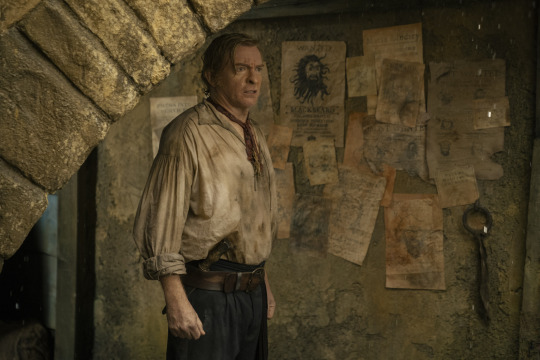
On the eve of the second season’s three-episode premiere, creator and showrunner David Jenkins reflected on the series’ approach to workplace dynamics, male friendships and romance, and the character arcs he’s most excited for fans to see.
The first three episodes of the season premiere feature a bunch of breakups and reshuffling of romantic and work relationships—not just Stede and Ed. Were you chasing anything in particular, narratively, by splitting up so many dyads?
Definitely. To watch the effects of Stede and Blackbeard’s relationship reverberate through everybody's lives is so interesting. Their separation doesn’t just happen to the two of them, it’s happening to all of them, because they’re a family. Just as the breakup reverberated throughout both crews, getting back together is going to do the same thing.
That makes sense.
The goal was just being true to the character beats and finding ways to make them ring true. Oluwande (Samson Kayo) and Jim (Vico Ortiz, they/them) are friends who got romantic. It rang true to me that they’d watch each others’ lives move forward, and then come back together to find that they still care about each other, and each of them is also happy for the other person. I've seen that happen in real life a bunch of times, but I don't see that dramatized a lot. I think there should be a lot of different flavors of relationships in this show. And there's so many different pairings that you get a lot of chances to be like, “Oh, how are these two different from Stede and Ed?”
How does that relate to your interest in exploring tenderness and vulnerability in male characters? In previous interviews, you’ve referred to Our Flag Means Death as examining the burlesque of masculinity. What does it bring to your work to be exploring it over the course of many hours of storytelling?
That’s an area where Taika’s and my interests overlap a lot. There’s something so understated about his sensibility—I think some of it derives from his New Zealand accent, actually—that suits asking questions about masculinity. And it's fun to look at pirate stories, to play against that genre’s whitewashed, heteronormative conventions. Growing up as a guy, you get a lot of pressure to be just one type of a guy, the guy who refuses to feel things. Men are in terrible trouble in that way. We’re getting better about talking about feelings, but there’s so much more to cover—body dysmorphia, vulnerability, not just talking about feelings, but understanding them and having this whole range of emotions—those are always the things I want to watch.
Do you have favorites among on-screen stories that make room for a broader emotional palette?
Heat and Midnight Run are two really lovely Robert De Niro movies where characters have these very big emotional lives. It’s a similar thing with Robert Redford and Paul Newman in Butch Cassidy and the Sundance Kid. I like extending that. We can push it further, because there's so many different ways to be a man! Not everything has to be a shoot ’em up action thing where people don’t have feelings. A lot of men feel like they need permission to just be their weird selves, to be funny, to dress differently. Try some different things! Maybe wear a color! Put some product in your hair! Don't worry about it, it's gonna be fine. You're gonna be fine.
Our Flag Means Death is not a casual show. It’s very funny and playful! But there is not one single frame of the show that plays it cool. As an artist, what’s the significance of qualities like sincerity and earnestness?
I hate coolness, it’s so ungenerous. And I like that you said that it’s not casual. I’m not a casual guy. This is a deeply uncool show. There’s something so special about seeing comedic actors like Rhys or Taika, who are so used to coming into a scene, being incredibly funny and destroying, and then leaving, having to use their earnestness, and not using their weapon of immediately diffusing it by going for a laugh. When I see that, it makes my heart leap. There’s something particularly special about seeing a comedic actor do it.
It’s really fun to watch comedic actors dispel the notion that dramatic acting is 180 degrees away from comedic acting.
Characters that call for that type of performance are a lot of what I love about Robert Altman, Christopher Guest, and Harold Ashby movies. They’re comedies, but those characters really grow and they experience pain, and the pain they feel is real. And then the funny shit that they do is even funnier because of it. Those are the things that bring me the most joy.
Tell me about Zheng Yi Sao, the Pirate Queen. She’s such a good foil for Ed and Stede—her ambition, competence, and leadership style are all so distinct from theirs.
Zheng Yi Sao is the most competent pirate captain on our show, and was the most successful pirate captain in history. She lived about 100 years apart from these fellas, and she was so successful that China had to cut her in and do a treaty with her so she would move on to some other field. She wound up making another fortune in gambling!
One thing that jumped out at me in these first three episodes of the season is how much therapy-literate dialogue is used—where did that come from?
I just think it's funny. The thing about a workplace is that they all see everything that’s going on with others, because they're all on top of each other all the time. I don't want to go l too far with it, but it’s fun that some of these characters can see that one of their friends is in a weird relationship with his boss, and then say “hey, you might want to look at that.”
Where do you think that comes from for the characters themselves?
There’s a level of care on that ship that Stede almost infected them with in the first season, and now those ideas are more alive because of how Stede built the Revenge’s culture. You can see that that spirit is still kind of alive when Jim tells the story of the wooden boy to Bang to calm him down. That’s a little bit of Stede’s kindness being alive in the world still, and of Jim needing and being able to call on it now that everything’s so dark. For them to go from an “every person for themselves” ethos to thinking “there was a time when life meant something on this ship, it doesn’t have to be this way” is interesting growth for the character, and is true to Vico as a person. There's a real kindness to how they carry themselves—they’re one of those people that just makes everybody feel safe. It’s nice to see some of those character traits bleed through to Jim.
Without getting too spoilery, what’s coming up over the rest of this season that you can’t wait for viewers to see?
I’m really excited for Izzy’s journey. Con O’Neill did such beautiful work, and getting to see where that character goes and how he grows, I think is one of the most exciting things of the season. To see where Ed and Stede’s relationship goes is gratifying—to see how they navigate each other and find, hopefully, a more mature way of being together.
Jim's relationships with Archie (Madeleine Sami) and Olu develop, too, and more broadly, the crew coming together as a new kind of family, now that Mom and Dad are getting back together. I also like that Lucius (Nathan Foad) is back, and has an angry young man thing going on that he has to process. For Lucius to go through something really harrowing and have to grow up with it is so interesting, because he had all the answers in the first season.
We can’t not talk about the mermaid sequence at the end of the second episode. How did that come about?
We really have to pick our shots on the show, so that was very storyboarded out. I knew I wanted Kate Bush’s “This Woman’s Work” for the scene, so that was incorporated in it. Unfortunately, Rhys had had a really bad near-drowning experience shooting in a tank before, but I didn’t know that until we were working on the stunts! But when Rhys saw the gorgeous tail, and it looked so cool and beautiful, he decided to go for it. He knew the scene was going to look awesome. So he navigated that costume, which is basically a big flipper that he needed to move his entire core to make it work, and Taika’s there with all this glue to keep his wig on underwater all day. When it’s humming and all the departments are working, everyone feels safe. It gives everyone a feeling of “let’s do it—let’s jump in!”
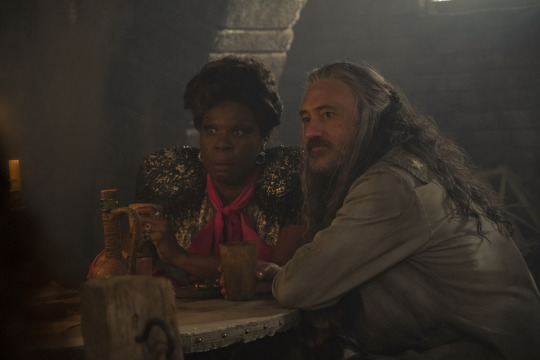
Speaking of jumping in, what degree of pressure did you all feel coming into the second season, knowing how high the expectations were from the show’s incredibly passionate fan base?
I don’t feel pressure from the fans, I just feel unconditional love and acceptance, and I think that the writers room feels that too. We all want it to be good, and we want the storylines to be cool. But it’s less pressure, and more just the level of freedom that it gave us, knowing somebody’s watching. It makes doing all the hard work a joy, because you know it’s going to be appreciated. Some people will have critiques, and that’s fine.
I just know that this—the fan reaction to this show—will be the honor of my career. The fan community is so kind and nice and talented—it's just a good vibe, and it’s been safe and affirming for everyone.
We’re all basking in the glow of the adoration of the show from our fanbase. It’s infectious—when we all get together, it saturates every element of the show, and it's a very special thing for all of us.
Source: The Daily Beast
299 notes
·
View notes
Text
"On April 4, 1967, exactly one year before his assassination, the Rev. Dr. Martin Luther King Jr. stepped up to the lectern at the Riverside Church in Manhattan. [...] Many of King’s strongest allies urged him to remain silent about the war or at least to soft-pedal any criticism. They knew that if he told the whole truth about the unjust and disastrous war he would be falsely labeled a Communist, suffer retaliation and severe backlash, alienate supporters and threaten the fragile progress of the civil rights movement.
King rejected all the well-meaning advice and said, 'I come to this magnificent house of worship tonight because my conscience leaves me no other choice. […] A time comes when silence is betrayal' and added, 'that time has come for us in relation to Vietnam.'
It was a lonely, moral stance. And it cost him. But it set an example of what is required of us if we are to honor our deepest values in times of crisis, even when silence would better serve our personal interests or the communities and causes we hold most dear. It’s what I think about when I go over the excuses and rationalizations that have kept me largely silent on one of the great moral challenges of our time: the crisis in Israel-Palestine.
I have not been alone. Until very recently, the entire Congress has remained mostly silent on the human rights nightmare that has unfolded in the occupied territories. Our elected representatives, who operate in a political environment where Israel's political lobby holds well-documented power, have consistently minimized and deflected criticism of the State of Israel, even as it has grown more emboldened in its occupation of Palestinian territory and adopted some practices reminiscent of apartheid in South Africa and Jim Crow segregation in the United States. [...]
Reading King’s speech at Riverside more than 50 years later, I am left with little doubt that his teachings and message require us to speak out passionately against the human rights crisis in Israel-Palestine, despite the risks and despite the complexity of the issues. King argued, when speaking of Vietnam, that even 'when the issues at hand seem as perplexing as they often do in the case of this dreadful conflict,' we must not be mesmerized by uncertainty. 'We must speak with all the humility that is appropriate to our limited vision, but we must speak.'
And so, if we are to honor King’s message and not merely the man, we must condemn Israel’s actions: unrelenting violations of international law, continued occupation of the West Bank, East Jerusalem, and Gaza, home demolitions and land confiscations. We must cry out at the treatment of Palestinians at checkpoints, the routine searches of their homes and restrictions on their movements, and the severely limited access to decent housing, schools, food, hospitals and water that many of them face.
We must not tolerate Israel’s refusal even to discuss the right of Palestinian refugees to return to their homes, as prescribed by United Nations resolutions, and we ought to question the U.S. government funds that have supported multiple hostilities and thousands of civilian casualties in Gaza, as well as the $38 billion the U.S. government has pledged in military support to Israel.
And finally, we must, with as much courage and conviction as we can muster, speak out against the system of legal discrimination that exists inside Israel, a system complete with, according to Adalah, the Legal Center for Arab Minority Rights in Israel, more than 50 laws that discriminate against Palestinians — such as the new nation-state law that says explicitly that only Jewish Israelis have the right of self-determination in Israel, ignoring the rights of the Arab minority that makes up 21 percent of the population. [...]
Indeed, King’s views may have evolved alongside many other spiritually grounded thinkers, like Rabbi Brian Walt, who has spoken publicly about the reasons that he abandoned his faith in what he viewed as political Zionism. To him, he recently explained to me, liberal Zionism meant that he believed in the creation of a Jewish state that would be a desperately needed safe haven and cultural center for Jewish people around the world, "a state that would reflect as well as honor the highest ideals of the Jewish tradition.” He said he grew up in South Africa in a family that shared those views and identified as a liberal Zionist, until his experiences in the occupied territories forever changed him.
During more than 20 visits to the West Bank and Gaza, he saw horrific human rights abuses, including Palestinian homes being bulldozed while people cried — children's toys strewn over one demolished site — and saw Palestinian lands being confiscated to make way for new illegal settlements subsidized by the Israeli government. He was forced to reckon with the reality that these demolitions, settlements and acts of violent dispossession were not rogue moves, but fully supported and enabled by the Israeli military. For him, the turning point was witnessing legalized discrimination against Palestinians — including streets for Jews only — which, he said, was worse in some ways than what he had witnessed as a boy in South Africa."
— Michelle Alexander, from her essay Time to Break the Silence on Palestine, as featured in the New York Times in 2019
169 notes
·
View notes
Text
still crying bc Jim leaning over Spock in a hospital bed, hands clasped, desperation alight, and Spock's famous line, "This simple feeling is beyond V'ger's comprehension."
this was in 1979. The AIDS crisis started in 1981.
That scene must have rang so agonizingly true for so many queer fans during those dark days. Another reason why Star Trek & Spirk are inexorably linked to queer history and queer fandom.
And not to sound vindictive because I genuinely don't mean it like that: but truly Star Trek is a queer fandom for a queer show. That is why modern iterations who gloss over or omit this, (or refuse to admit this) just do not ring true to the fandom.
Straight or Queer - it doesn't matter who you are - if you enjoy Trek you enjoy it for what it is and you can instantly recognize when it is not itself. You veritably cannot de-queer Trek.
It is empowering, beautiful, and truly goes where no one has gone before.
#it always makes me tear up#spirk#i cant imagine seeing that on TV during the aids crisis#the movie was made a bit beforehand#but it was still relatively new those first few years#and just... god#the pain
279 notes
·
View notes
Text
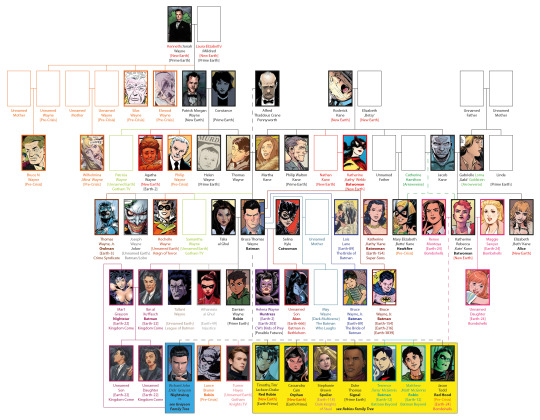


Family Trees of the Multiverse: Bat Family
The last of my Multiverse Family Trees!
And due to the family's size, it got split into three trees, for clearer visualization. The Wayne/Kane family for one, all the Robins and their parents, siblings and children got their own, and due to Dick's messy multiverse-life, and the fact that the majority of his kids are Babs' kids, Dick and Babs share a third tree.
As always, color-coded. However, due to just how big this family mess is, I'm not listing all the colors. Just the three key colors:
Black represents current Prime Earth continuity, red indicates a character or relation is from the New Earth continuity and orange stands for the Pre-Crisis continuity (-> if it says [New Earth] beneath the character in red but the frame is black, that means the character was first introduced during the New Earth continuity and continues existing; if the frame-color matches the label, then the character is exclusive to that era/Earth).
Some notes for additional clarification since things are MessyTM:
Terry and Matt McGinnis are technically biologically Bruce's children, since Amanda Waller altered their father's DNA into Bruce's. I don't know how to visualize that in a family tree and since they are his adopted children in later comic continuity, they go into the adopted children section.
Usually, when parents have various names throughout incarnation, I just indicate that by color, but in Jason Todd's case, Joe and Trina as the Flying Todds are very different people from small-time criminal Willis and his wife Sheila, so Jason gets two sets of parents on the tree.
Barbara Gordon's backstory is a mess; she was first conceived as the biological child of Jim and Thelma in Pre-Crisis continuity, then became the biological child of Jim's brother Roger and Thelma, who got adopted by Jim and Barbara Eileen and to whom Sarah Essen was a stepmother, however in Gotham Noir, Sarah Essen is her biological mother. Also, Babs has three different middle names - Lee in the Gotham TV continuity, Kathleen in the Killing Joke movie, and as of the Prime Earth continuity, she got the middle name Joan (before that, she was just Barbara Gordon).
#Family Tree#Family Trees of the Multiverse#Bat Family#Bat Fam#Bruce Wayne#Batman#Kate Kane#Barbara Gordon#Dick Grayson#Jason Todd#Tim Drake#Cassandra Cain#Stephanie Brown#Duke Thomas#Terry McGinnis#Matt McGinnis#DC Comics#this was A LOT of work but also A LOT of fun#I always love digging up new kids/relatives#that I had previously not known about
260 notes
·
View notes
Text
What if the Metatron is scared of Crowley?
The S2 brain rot is still going strong so I have to share my meta thoughts somewhere. I guess it's gonna be tumblr, isn't it? Would you like to spend a lot of time dissecting what the Metatron says with me? Okay here we go...
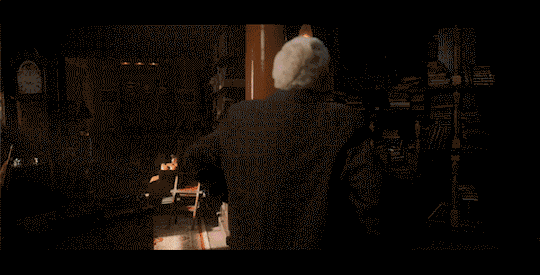
So the full line here is "He always wanted to go his own way. Always asking damned fool questions, too." I think the "Always" and the ",too." are doing some pretty heavy lifting in this sentence. Because we've seen him asking questions before the fall (more on that in another post) we assume The Metatron is referencing that time before.
But what if he isn't?
What if he's referencing this scene from the opening of S2E1 where Crowley is seemingly now having an existential crisis that is weirdly never referenced again in the season.

"But Crowley is always asking questions!" You cry.
Yeah, he is. An the metatron is getting pretty f*&?ing sick of his shit. You want to watch another time he asks a question after this scene in S2E1?
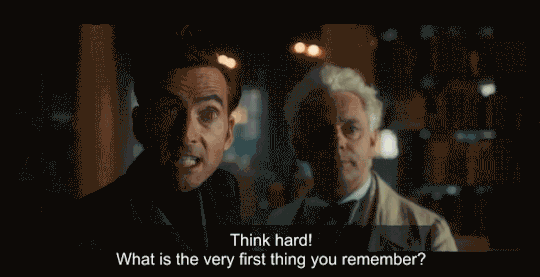
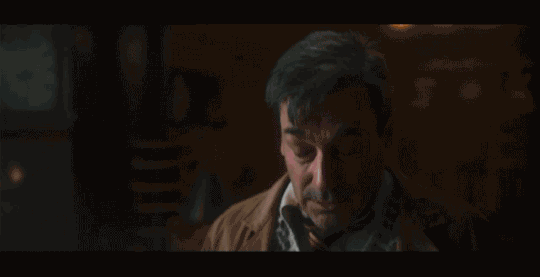
Seems like Crowley is doing some mighty fine asking already this season!
After finishing season 2 I really started wondering why The Metatron was interfering with our boys now? I mean, they were right there the whole time. The Metatron clearly knows where they are for years. Even though Crowley has been asking question for all time forever and clearly some part of heaven hates that, it seems like maybe these questions at this point in time might actually be very harmful to the Metatron's plans.
Remember when Jimbriel says this in S2E1?
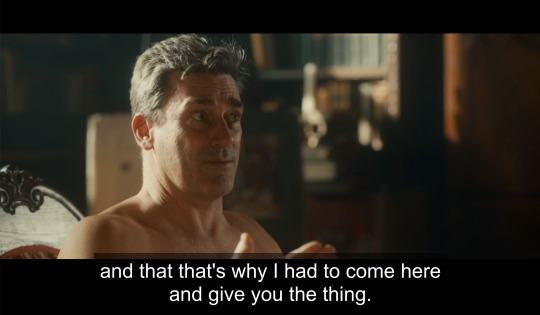
Except Jim never gives Azirapalalah anything the whole season? The matchbox stays in heaven. He doesn't give him the box either. It stays outside and must be fetched.
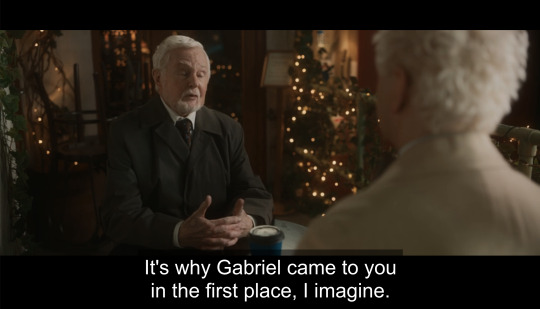
So when the metatron says "You're a leader, you're honest, you dont just tell people what they want to hear. It's why Gabriel came to you in the first place, I imagine." I think we can surmise that Gabriel was trying to come to Aziraphael to give him something important, but it never happened (OR DID IT? That's for another post...).
So if The Metatron is breathing a huge sigh of relief here because he thinks he's confirmed Gabriel didn't give Aziraphael anything, the last thing he needs to do is separate the really good question asker from his will to ask any more good questions.
"But how does the metatron know Gabriel didn't give him anything? What does he have like a stupid spy camera or something inside the bookshop?" Guys the art direction in this show in bonkers, I'm telling you.

OH LOOK. A WHITE GIANT FLOATING HEAD IN ALL THEIR CONVERSATIONS IN THE BOOKSHOP.
So my reading of the original line is something like : "Crowley wanted to not follow heaven, which caused him to fall with the guys. But also I've been watching him do reckless and annoying question asking right now. And that's currently ruining my plans and I've had enough. Get that idiot away from the bookshop."
#ineffable husbands#crowley#neil gaiman#crowley x aziraphale#good omens s2#go2#go2 meta#good omens meta#good omens season two#metatron#art director talks good omens#good omens spoilers#good omens gabriel
253 notes
·
View notes
Text
Referring to the Bat Family as the "Wayne Family" absolutely rubs me the wrong way; it's a disservice to each of them and their relationships with each other (and Bruce). In Post-Crisis, there are canonically four 'Wayne's; Bruce Wayne, Tim Drake-Wayne, Cassandra Cain-Wayne and Damian Wayne. Kate Kane is related to Bruce but they don't really interact without a mask on.
Dick was adopted as Bruce's ward, keeping his last name, because he didn't want to replace John and Mary with Bruce. He's a Grayson and never wanted to be a Wayne. That's so narratively important!! Babs is proudly a Gordon by way of Jim, and although she did eventually marry into the family, her husband is Grayson. Steph already has a mother, and isn't "family" in the traditional sense. Babs is her mentor and friend in a way Bruce wasn't but Bruce was also never her dad figure. She's, in a way, Tim's ex who everyone initially had reservations about and mistreated but who they've grown to love and invite to everything (kinda more than Tim really). She'd probably hate to be referred to as a Wayne because that wholly misrepresents her experiences and working-class background. Also Bruce BETTER pay off Steph's student loan as some reparations, our girl struggled with college finances. The phrase seems to largely neglect Helena as a part of the Gotham Bunch so BOOOO. Funny enough, it's Helena who actually kinda saw Bruce as a father figure of sorts. Jason would literally rather kill than be referred to as a Wayne and he definitely didn't live under the same roof as anyone here since he died. On that note, there was never a time where more than 3 of these people lived under the same roof; in fact, Dick hasn't lived in the manor since he left for college. They were NEVER this perfect, upper-crust family idly living in a mansion by day and beating up petty thieves by night.
#enough with the perfect family crap#i like this family because it's a mess#bat family#batfam#dc comics#batman#batman and robin#bruce wayne#dick grayson#barbara gordon#stephanie brown#helena bertinelli#jason todd#tim drake#cassandra cain#damian wayne#wayne family adventures
168 notes
·
View notes
Text
Okay so here’s my pitch for the season 3 cold open-
We open to a close up of Stede’s face, he’s clearly concentrating, he’s sweating a little, and covered in blood. It’s pretty clear as we pan out to a shoulder shot that he just killed someone. He looks very sexy about it.
We switch to a close up of Ed’s face, sweaty, clearly has just been fucked. Maybe his top button is done up wrong. Who knows.
The shot pans out and we start hearing their conversation. They are outside the inn, digging up Izzy (stick with me)- they’re talking about how silly they feel for just now realizing this is the problem- OF COURSE Izzy has been so mad, they didn’t bury him with his ring! How silly of them! And they didn’t even notice until someone tried to rob them and Stede killed the robber (and they fucked about it). THAT must be why Izzy won’t stop haunting them. They tuck the ring into his breast pocket and start to rebury him.
Next shot- we find out that they think Izzy has been haunting them because of a the ~weird happenings~ at the Inn. The haunting does not stop after they bury the ring. This part of the episode starts very creepy, real horror movie vibes. However, we find out through the course of the episode that what they think is a haunting is just two whim prone chuckleheads with no experience running an Inn.
“All of the produce mysteriously went bad!” - Stede, whose experience with food preparation is putting marmalade on toast just left them too close to the fire and the heat did what it does to produce.
“The room keys keep going missing!” Nope. Ed simply cannot remember where he put them.
“The desk bell keeps ringing at night but there is no one there!” It’s buttons the seagull fucking with them.
They both think they’re responsible for the haunting and having a crisis about it. Idk, dealers choice about what they feel guilty about.
They are losing their fucking shit over this haunting. Maybe Izzy shows up once or twice in a Badminton style memory ghost.
We pan back to The Revenge. It’s a total parallel to what happened with the red suit.
They also think they are being haunted by Izzy.
The word “twat” keeps appearing carved into random places aboard the ship. Frenchie’s peanut allergy is back full swing. They keep sailing into storms by accident. Etc
They set sail for the Inn, desperate to ask Ed to control the ghost of his dead best friend or burn the body, anything to get rid of this fucking ghost.
It’s Jim fucking with them and dumb luck. (Except for the storm thing, it’s just impossible for anyone to read the weather as well as Ed)
They all meet up at the Inn, and now we have a Scooby Doo style episode where the ghost was the friendship and character growth we made along the way.
And then for an extra layer of comedy, maybe at the end of the season we see Izzy’s ghost just sort of old man loitering around the ship because he didn’t want to leave what I am affectionately deeming his kids.
Thank you for coming to my TedTalk
#ofmd#our flag means death#ofmd spoilers#edward teach#ofmd s2#stede bonnet#gentlebeard#gentleman pirate#blackbeard#frenchie#jim jimenez#buttons#buttons the sea witch#izzy hands#roach ofmd#I think roach knows its just Jim fucking with them but it’s funnier to let it happen#I think if Izzy’s ghost was present he wouldn’t be hovering around Ed to bully him but instead he’d be watching over his crew#eternal first mate and whatnot#blackbonnet#hey just a friendly note that if you message me “I fucking hate Izzy hands and am glad he’s dead but this made me laugh#I will respond by blocking you#I’m just here to be silly and I don’t need that negativity my dude
124 notes
·
View notes
Text
The thing about comics canon is that sometimes the level of complexity is off the charts.
Take Barbara and Jim Gordon’s relationship.
Babs is Jim’s daughter. That’s a truth in all continuities.
But her birth parents?
Are they Jim Gordon and Thelma/Barbara Gordon (Silver Age, Who's Who: The Definitive Directory of the DC Universe #2), where her biological brother is Tony Gordon? (Pre-crisis can’t decide on what Barbara’s mother’s name is and how many times Jim’s been married)
Are they Roger Gordon and Thelma Gordon (post-Crisis, Secret Origins v2 #20), where Jim and Barbara Eileen adopted Babs after her parents died in a car crash and her cousin and adoptive brother is James Gordon Jnr?
Are they Jim Gordon and Thelma Gordon (post-Crisis, Gotham Knights #6), where Jim had an affair with his sister-in-law that may have resulted in the pregnancy that led to Barbara, and her half-brother is James Gordon Jnr?
Are they Jim Gordon and Barbara Eileen Gordon (new 52, Batgirl v4 #5) where her biological brother is James Gordon Jnr?
Because each of these graduations changes things. Tony is Babs’ older brother. James Jnr is her younger brother.
James Jnr’s psychopathy has an additional twist to it if Barbara joined the family as a pre-teen, where he’s already acting out and being creepy, as does Barbara Eileen leaving with James Jnr. She’s legitimately terrified for her life about her new sibling and nobody is listening.
Whereas if James Jnr is her biological brother and they grew up together, Barbara’s been watching him his entire life, and seen his slide and so spent her childhood questioning herself on how bad he’s become makes even more sense, because that’s her little brother. But also she found him torturing animals, she can never be sure if the action he just took was meant to hurt or to help, etc etc.
And each permutation of this story brings a different edge to Babs’ childhood and backstory. But simultaneously there’s a central truth – the person Barbara calls Dad is Jim Gordon, and that aspect of their relationship on page has never, ever changed.
#barbara gordon#jim gordon#can the gordon family use more than 3 names? impossible#(bring back the adoption AND Tony and make it even more complex DC. I believe in you)
75 notes
·
View notes